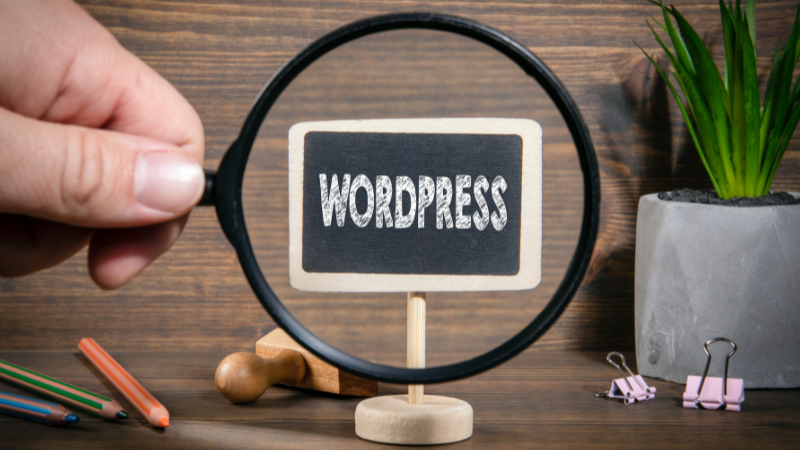WordPress is flexible, easy to use, and powers nearly half of all websites on the internet. But that popularity comes with a downside: WordPress is also one of the most targeted platforms for cyberattacks.
Whether you’re a mortgage lender, senior living provider, or law firm, your website is a vital part of your marketing and lead generation strategy. It’s where prospects learn about you, where clients request services, and where sensitive information might be collected.
So the big question is: Is your WordPress website actually secure in 2025?
If you’re not sure, you’re in the right place. In this guide, we’ll walk through everything you need to know to protect your WordPress website from the latest threats.
Schedule a Discovery Session
Learn how to attract new leads and clients.
Why WordPress security matters more than ever in 2025
Hackers are no longer targeting only big brands.
Automated bots scan thousands of sites every day, looking for outdated plugins, weak passwords, and easy wins.
And if you’re collecting leads through forms or using third-party tools like CRMs, you’re even more of a target.
What’s at stake:
- Data breaches and lost client information
- Google penalties and search engine delisting
- Downtime that hurts traffic and conversions
- Reputation damage that undermines trust
- Legal consequences if your site doesn’t meet security or accessibility compliance (e.g., GDPR, ADA, HIPAA)
Even a small vulnerability, such as a forgotten plugin, can escalate into a major problem.
Think of your website like a digital storefront: unlocked doors or broken windows make you an easy target.
Emerging threats and security trends in 2025
New threats target WordPress sites faster and more aggressively than ever. Here’s what to watch for:
- Zero-day plugin exploits: Popular plugins are attacked within hours of new vulnerabilities being discovered—often before a patch is released.
- AI-driven bot attacks: Sophisticated bots mimic human behavior, bypass CAPTCHA, and perform credential stuffing using stolen data.
- Form and CRM abuse: Lead forms and integrations with CRMs are common attack vectors on marketing-heavy sites, used to inject spam or steal data.
- Regulatory compliance risks: Security failures can now trigger fines under GDPR, ADA/WCAG 2.1, and similar frameworks.
- Phishing escalation: Spoofed login pages and targeted phishing emails are more convincing than ever, catching even cautious users.
Bottom line: If you built your WordPress security strategy years ago and haven’t updated it, now’s the time.
6 essential steps to secure your WordPress website
1. Stay updated: WordPress core, themes, and plugins
Most successful attacks exploit outdated software. Enable automatic updates for WordPress core, themes, and plugins, and remove anything you’re not actively using. Regularly review your plugin list and replace any that are abandoned or no longer supported.
Use a staging environment to safely test updates before deploying them live, especially if you rely on custom code or integrations.
2. Harden your login process
The easiest way to access a WordPress site is through its login page.
- Avoid using “admin” as a username.
- Require strong passwords or passphrases.
- Implement two-factor authentication (2FA).
- Limit login attempts and use reCAPTCHA.
- Restrict or rename the wp-login.php page.
These simple changes can block the majority of brute-force attacks before they start.
3. Install a security plugin or WAF
Use a trusted security plugin with malware scanning, file change detection, and real-time alerts. Look for tools that include a web application firewall (WAF) to stop attacks before they reach your site. Recommended options: Wordfence, iThemes Security Pro, Sucuri, and Jetpack Security.
4. Use secure WordPress hosting
Choose a website host that offers isolated server environments, daily backups, SSL certificates, DDoS protection, and 24/7 support. Managed WordPress hosts, such as WP Engine and Kinsta, combine performance with built-in security monitoring.
5. Schedule regular backups
Even strong defenses can fail. Set daily automated backups for both files and databases, stored off-site (e.g., Dropbox, Amazon S3). Test restore processes regularly to ensure quick recovery in an emergency.
6. Monitor your site and get alerts
Set up tools that monitor uptime, detect malware, and flag plugin vulnerabilities. Many include dashboards or email alerts so you can act fast. Integrations with Slack or email help keep your team informed in real time.
Common mistakes that leave WordPress sites vulnerable
If your site is at risk, chances are it’s because of one of these issues:
- Using abandoned or pirated plugins
- Letting themes/plugins go out of date
- Weak or reused passwords
- No backups (or backups stored on the same server)
- Relying solely on default WordPress settings
- Giving all users “Admin” permissions
- Failing to use HTTPS or expired SSL certificates
Fixing these doesn’t require a security degree, just a little consistency and some smart tools.
Advanced protections for high-risk or regulated sites
If you’re in a sensitive or regulated industry like law, lending, or senior care, consider taking it a step further:
- IP/geolocation-based login restrictions
- Activity logging for compliance audits
- Bot traffic filtering and rate limiting
- Content Security Policy (CSP) headers
- Headless WordPress or static site caching for minimal attack surface
- Vulnerability scanning as part of your compliance reporting
- Role-based access control for teams and third-party vendors
Security should match your risk level. Don’t treat a lead-gen site with sensitive form data like a personal blog.
Who manages your site’s security?
Too often, no one owns the responsibility. WordPress security isn’t a one-time setup—it requires ongoing updates, access reviews, and incident response.
If no one is actively monitoring changes, reviewing logs, and managing backups, your site is vulnerable by default.
How Kaleidico can help with WordPress security and maintenance
We provide fully managed WordPress hosting and maintenance through our trusted partner, WP Engine.
This service is included as part of our broader marketing engagements—designed to keep your site secure, fast, and reliable.
Our support includes:
- Plugin and theme updates, tested in a staging environment
- Daily backups with restore support
- SSL certificate setup and renewal
- Firewall and malware protection via WP Engine’s security stack
- Uptime and performance monitoring
- Responsive support for urgent issues
If your WordPress site is central to your lead generation, we’ll help to make sure it’s protected and high-performing—so you can focus on growing your business.
WordPress security is a process, not a plugin
Unfortunately, there’s no magic plugin that guarantees security in 2025. You must layer protections, monitor them regularly, and take ownership of your digital footprint.
Even a few small changes can make a big difference. Start with what’s easy: secure your logins, enable backups, and keep everything up to date. Then build toward a full-stack security strategy.
Not sure where to start? Tell us about your goals—we’ll help you secure your WordPress website and build a smarter marketing strategy.

